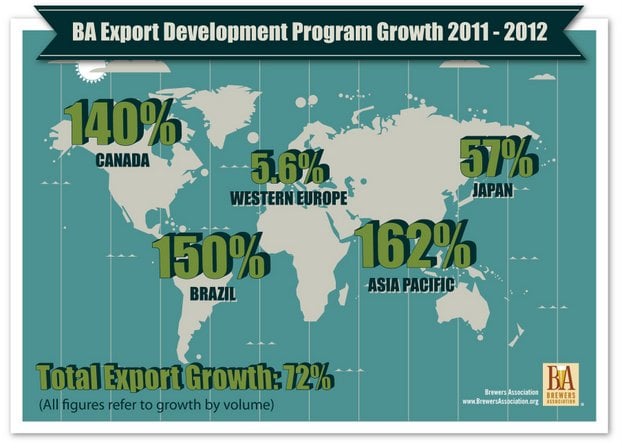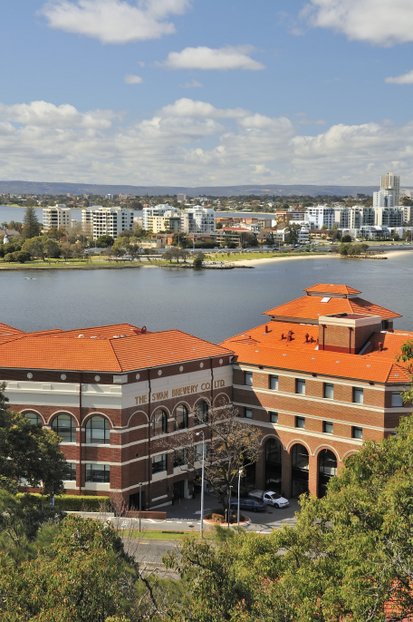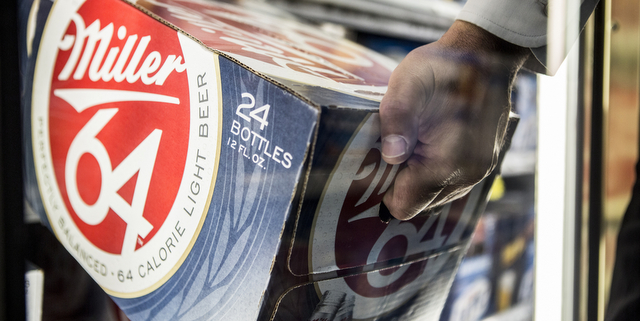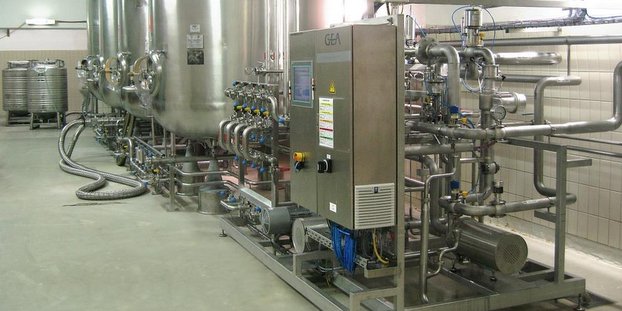
The craft beer revolution rose out of the United States, but its influential waves are being felt around the world. The beer industry is increasingly a global marketplace, indicative of the beer mergers, roll-ups and acquisitions of heavyweights like Anheuser-Busch InBev and SABMiller. Those giants operate product strategies in markets as diverse as Cleveland and Calcutta, but craft beer makers are also increasingly growing their global footprint as well.
We felt that at the Craft Brewers Conference in March where an increasing amount of international exhibitors catered to the American craft marketplace — from famous German brewhouse and vessel manufacturers like GEA Brewing Systems to global hops producers like Alpine Hops, which represents farmers in Slovenia (Slovenia is actually Europe’s third-largest hops producer and sixth in the world). The Brewers Association, the not-for-profit trade group representing small and independent craft brewers, reported in March that the American craft beer industry set a new record for exports in 2012. Based on results from a recently completed industry survey, craft beer export volume increased by an astounding 72 percent compared to 2011, with a value estimated at $49.1 million.
We see these international craft markets growing and merging even further, and we’ll occasionally bring you news showcasing that fact. Here are three craft beer stories from around the world.
Discerning Germans begin to import the likes of Firestone Walker
Germans are beer lovers from way back. The Benedictine Weihenstephan Abbey, founded in 725, is the oldest still operating brewery in the world (it started brewing in 1040). The famous Munich brand Löwenbräu, which is now owned by AB InBev, traces its roots back to the 14th century. Beer has been made in Bavaria longer than the United States has been a country, but American crafts are now starting to make their way to the German motherland, at least according to this excellent article from Fort Wayne, Ind.’s The Journal Gazette:
In the last year in Berlin, high-end U.S. beer — including one from California that is flown over in coolers — has become available in some grocery stores, and several U.S.-style craft breweries have opened. The efforts aim to challenge the dominance of plain-old pilsner, the mild lager that dominates more than half of beer sales in Germany. Beer consumption is slipping in Germany, and some brewers say their only salvation lies in fostering a drinking culture less constrained by a 1516 purity law that they say crimps innovation.
“What we’ve found in the United States is this amazing variety of styles and the openness of customers to new things,” said Marc Rauschmann, who is importing beer from California-based Firestone Walker Brewing Co. in air-freighted coolers. Other beer is shipped by sea. “We were really impressed.”
The article noted that Rauschmann and others are traveling to Germany to spread the gospel of craft. His company, Braufactum, is owned by German beer giant Radeberger, which Rauschmann said was trying to help spark a new beer culture in the country where it has been a major producer since 1872.
According to the Brewers Association, Sweden and the United Kingdom remained the two largest American craft beer export markets in Europe in 2012. Though total exports decreased in both countries compared to 2011, the decline was offset by increased shipments to other European markets like Germany. In total, Western Europe accounted for 56,204 barrels (bbls) valued at $14.6 million in 2012, a 5.6 percent increase over 2011.

China’s craft beer niche relies a lot on pricing
There are more than 1.3 billion people in China today, and that populous has a growing thirst for beer. In fact, China is the largest beer market in the world. According to Just-Drinks, the market is worth 450m hectolitres (hl) per year, about 25 percent of global beer consumption. China is twice the size of the second largest market, the United States, but it only accounts for an estimated 3 percent of the global beer profit pool and ranks eighth in profit terms. Why? Beer pricing remains low in China and profit margins are thin. Consolidation of the fragmented Chinese beer industry remains an important long-term trend and one that will lead eventually to greater industry profitability. The leading players today according to Just-Drinks:
- China Resources Snow (49 percent owned by SABMiller)
- Tsingtao (20 percent owned by Asahi)
- Anheuser-Busch InBev
- Beijing Yanjing (state-owned)
Since prices are so low in China, craft beer will have its challenges in the marketplace, but it still has its niche when it’s locally produced. According to ChinaDaily USA, Bad Monkey Brewery (in the popular tourist town of Dali in Yunnan) may be an anomaly in rural China, but it’s part of a small yet nascent business of craft beer making in the world’s most populous nation.
“Our company has witnessed the changes in consumer preferences first-hand in China since 2003,” wrote Carl Oakley and Scott Williams, owners of Bad Monkey, in a comment in response to a Wall Street Journal article about craft brewers collaborating in China. “[We have found] many Chinese drinkers who are adventurous enough and affluent enough to pay more for a tastier, higher quality brew.’
Other craft-beer companies in China include Chengdu Beer and Harvest Beer in Chengdu, Sichuan province; Strong Ale Works in Qingdao, Shandong province; The Old Brewery in Yangzhou and Nanjing Craft Brewing Co in Nanjing, Jiangsu province. The strongest presence in the emerging craft-beer revolution is in Shanghai and Beijing, where six — soon to be seven — homegrown craft breweries exist.
“The craft-beer industry in China is without a doubt going to expand rapidly within the next five to 10 years,” said Leon Mickelson, brewmaster at The Brew in Shanghai. “I see more and more craft-brew pubs opening up within Beijing and Shanghai, which will raise a lot more awareness and will ultimately benefit the industry as a whole.”
We encourage you to read the entire article, which is extensive. Pricing will be the real challenge in China. According to the article, a bottle of local beer can sell for as little as 1.87 yuan (30 cents). Beijing-based Great Leap Brewing’s rotating selection of 12 to 15 craft beers on tap sell for 25 to 50 yuan.

Australians look to government to grow local craft scene
Australia’s Craft Beer Industry Association is currently preparing for its inaugural Australian Craft Brewers’ Conference, to be held on May 22 and May 23, highlighting this year’s Good Beer Week in Melbourne. Big name American craft brands like Founders and Sam Adams do business in Australia. According to the Brewers Association, American craft beer export growth to Asia Pacific (which includes Australia) was up 162 percent in 2012.
Just recently, another Australian craft beer group, called the Australian Real Craft Beer Association (or ARCBA), announced it was seeking the support of political parties in the upcoming May budget to help the craft beer industry in Australia build strong independent brewers, create jobs and become export-ready. The association released a white paper calling for an increase in excise tax rebates for small and independent brewers to $300,000, with a view to further increases over time to “bring Australia in line with the average for OECD countries.” We quote the website The Shout:
As well as revised excise spending, the ARCBA wants access to investment grants for small brewers to improve their energy efficiency and foster tourism, and government support for increasing the value-add for Australia’s malt export industry.
“The craft beer industry in Australia received a measure of relief in last year’s federal budget, thanks to the tireless work of members of the craft brewing industry,” reports Stephanie Collins, editor of Beer & Brewer magazine.
“Unfortunately, there is always more to be done and the federal government needs to take a long, hard look at what they do to support small breweries around the country.”
The comments echo those of the ARCBA, which aims to help build a robust industry. “It is time to get behind Australian small independent brewers, bringing Australian real craft beer in line with the rest of the world, providing access to investment funding to grow the real craft beer industry and letting Australians enjoy and appreciate real craft beers,” said David Hollyoak, ARCBA chairman.





The World of Craft Beer: Campaigns in China, Germany and Australia http://t.co/qbyGp3hjw0
RT @CraftBrewingBiz: The World of Craft Beer: We look at craft beer campaigns in China, Germany and Australia http://t.co/nWASlwTVHI